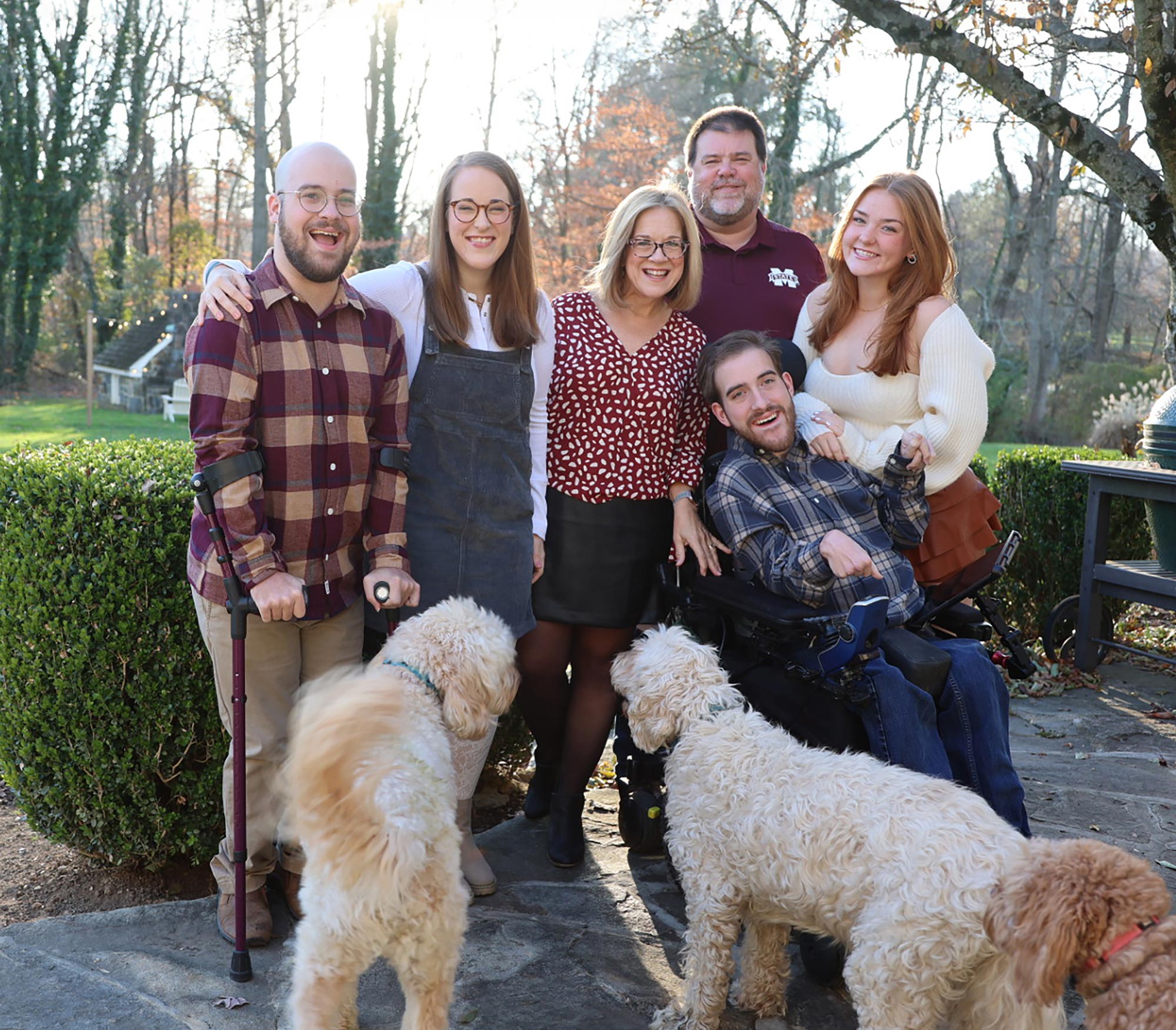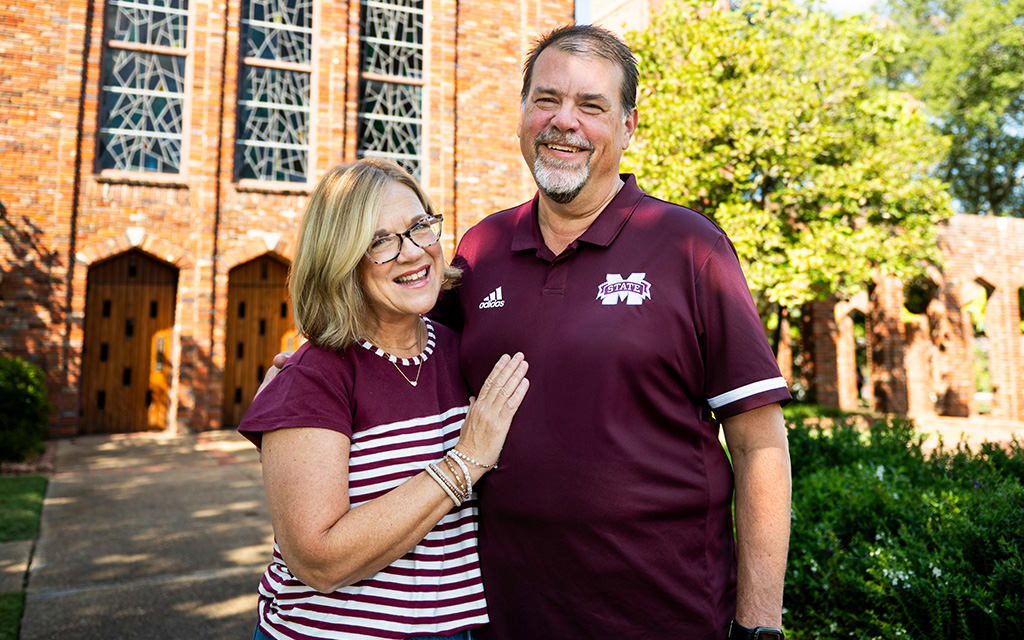MSU alums answer call to medicine, advocacy while raising sons with cerebral palsy
When Wade and Carol Shrader were nearing graduation in the early 1990s, the careful planners sat in Mississippi State’s Chapel of Memories to sketch out a life plan in a notebook of engineering paper.
Wade, the soon-to-be aerospace engineering graduate, would work for NASA, pushing the boundaries of space flight. Communication major Carol, editor of The Reflector, would launch a career in journalism. However, like most people in their early 20s, the young couple could never have anticipated life’s curveballs.
“The day that the doctor held up three fingers, several pages were torn from our plan,” Carol recalled of the day she found out she was pregnant with triplets. “We were shocked. Everybody was shocked.
“Soon we had these three babies who were born super early. But we still thought we were in charge, somehow,” the Tupelo native said.
As the triplets—two boys and a girl—grew during their first year, developmental delays in the boys became apparent. Eventually both Benjamin and Mason were diagnosed with cerebral palsy—a diagnosis that would shape the careers and lives of both parents.
Before the triplets were born, Wade was already transitioning from a career at NASA to a career in medicine. He spent 1991-95 working on next generation launch vehicles and projects designed for future missions to the moon and Mars. However, as federal commitment to space programs waned, he sought a different path and enrolled in medical school at the University of Chicago. The Pontotoc native trained to be an orthopedic surgeon, thinking he would primarily focus on joint replacements or sports medicine.
Following his sons’ diagnosis, Wade once again altered his path, shifting his focus to an area that could impact children with disabilities–pediatric orthopedic surgery. Wade’s career in pediatric orthopedic surgery has included stops in Phoenix and at the University of Mississippi Medical Center in Jackson. While at UMMC, another curveball came Wade’s way when he was asked to lead the Cerebral Palsy Center at Nemours Children’s Hospital in Delaware, one of the country’s leading cerebral palsy research and treatment centers.
“My whole practice is about taking care of kids with cerebral palsy, spina bifida and other disabilities. I always try to convey to patients and their families that we know what they are going through. We try to provide support to the families because I know how hard it was for us to go through those things, and we really want to do everything we can to make it easier for them to go through it.”
~ Wade Shrader
“This is a big stage where we can do a lot of research and outreach to impact as many people as we can,” Wade said. “But it’s a very personal thing for me. My whole practice is about taking care of kids with cerebral palsy, spina bifida and other disabilities.
“I always try to convey to patients and their families that we know what they are going through,” he continued, “We try to provide support to the families because I know how hard it was for us to go through those things, and we really want to do everything we can to make it easier for them.”
Nemours has a program for training residents and fellows who will go on to be leaders in cerebral palsy treatment in their region. There is also a program for surgeons from around the world. Wade recently performed a surgery that was broadcast to more than 6,000 viewers around the world to help demonstrate proper technique.
“I felt a lot of pressure doing a live surgery with 6,000 people watching,” Wade said. “But that’s the challenge – to try to uphold the standards we would want for own kids. I try to keep those standards in the research and treatment that we do.”
LEARNING TO EMBRACE DIFFERENT EXPECTATIONS
In the years immediately following her sons’ cerebral palsy diagnosis, Carol said she had to learn to stop putting her own expectations on children who were ultimately going to have lives that looked very different from what she experienced.
For instance, when Benjamin was 5, he struggled to use a walker. His mother and physical therapists worked diligently toward the goal of having him walk. He, however, really wanted to talk.
“Benjamin’s guiding star was that he wanted to be able to talk, debate and argue, but in pushing him to walk, I had made him too exhausted to talk,” Carol said. “The day he realized he could roll and stay with his friends and talk their ears off at the same time, it was life changing for him.
“I had to take my ideas of what was perfect and remove them so he could be himself,” she continued. “That’s hard for parents, and I think that’s true whether your child has a disability or not. Frankly, we have to get out of the way and let their own North Star guide them.”
Later, Mason pushed Carol out of her comfort zone as he encouraged her to create a blog about her experience raising sons with cerebral palsy. With a background in journalism and public relations, she was used to sharing stories. Still, she said she was hesitant to share her family’s experiences in such a public forum.
Ultimately, and with her family’s support, she created the online presence to share their triumphs and struggles as a way of helping other parents who were raising children with disabilities. The experience of sharing her story helps her now to advocate for others as the policy director for the Delaware State Council for Persons with Disabilities.

Despite multiple moves across the country, the Shraders and their children have remained strong Bulldog supporters. Pictured, from left, are Mason, Claire, Carol, Wade, Benjamin and Cate Shrader.
TURNING DIFFERENCES INTO SUCCESS
Now adults, Benjamin and Mason have carved their own paths. Benjamin is a magna cum laude graduate of Belhaven University, with a degree in theater and a minor in political science. Now in his mid-20s, he is an advocate for people with disabilities and a public speaker. Mason, who developed an interest in archaeology, just began a doctoral program at Brown University where he is studying disability in the ancient world. They also influenced the path of fellow triplet, Claire, who graduated from occupational therapy school last year and now works with children who have cerebral palsy. The career path for the Shraders’ youngest daughter, 17-year-old Cate, remains to be determined.
Even though they live in Delaware, the Shraders still make regular trips to Starkville to watch Bulldog football and baseball. The life plans that Carol and Wade sketched out in the Chapel of Memories three decades ago may not have held up, but, like the hitters they enjoy watching at Dudy Noble, they have learned how to adapt to a curveball, all while helping others find hope in some of life’s most challenging situations.
“I always try to encourage parents to focus on the hope of their child and family,” Wade said. “We’re all different as human beings, and sometimes that difference is in our disabilities.
We should celebrate those differences and learn from one another,” he continued. “There’s always hope. For any parent going through it, I always encourage them to focus on that rather than some of the struggles.”
By James Carskadon, Photos by Grace Cockrell & Submitted


